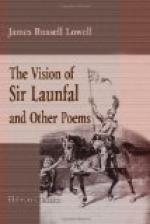It is generally stated that the influence of Maria White made Lowell an Abolitionist, but this is only qualifiedly true. A year before he had met her he wrote to a friend: “The Abolitionists are the only ones with whom I sympathize of the present extant parties.” Freedom, justice, humanitarianism were fundamental to his native idealism. Maria White’s enthusiasm and devotion to the cause served to crystallize his sentiments and to stimulate him to a practical participation in the movement. Both wrote for the Liberty Bell, an annual published in the interests of the anti-slavery agitation. Immediately after their marriage they went to Philadelphia where Lowell for a time was an editorial writer for the Pennsylvania Freeman, an anti-slavery journal once edited by Whittier. During the next six years he was a regular contributor to the Anti-Slavery Standard, published in New York. In all of this prose writing Lowell exhibited the ardent spirit of the reformer, although he never adopted the extreme views of Garrison and others of the ultra-radical wing of the party.
But Lowell’s greatest contribution to the anti-slavery cause was the Biglow Papers, a series of satirical poems in the Yankee dialect, aimed at the politicians who were responsible for the Mexican War, a war undertaken, as he believed, in the interests of the Southern slaveholders. Hitherto the Abolitionists had been regarded with contempt by the conservative, complacent advocates of peace and “compromise,” and to join them was essentially to lose caste in the best society. But now a laughing prophet had arisen whose tongue was tipped with fire. The Biglow Papers was an unexpected blow to the slave power. Never before had humor been used directly as a weapon in political warfare. Soon the whole country was ringing with the homely phrases of Hosea Biglow’s satiric humor, and deriding conservatism began to change countenance. “No speech, no plea, no appeal,” says George William Curtis, “was comparable in popular and permanent effect with this pitiless tempest of fire and hail, in the form of wit, argument, satire, knowledge, insight, learning, common-sense, and patriotism. It was humor of the purest strain, but humor in deadly earnest.” As an embodiment of the elemental Yankee character and speech it is a classic of final authority. Says Curtis, “Burns did not give to the Scotch tongue a nobler immortality than Lowell gave to the dialect of New England.”




